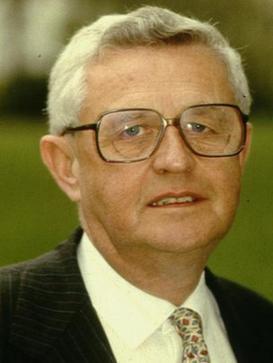John Cole (journalist) facts for kids
Quick facts for kids
John Cole
|
|
|---|---|
 |
|
| Born |
John Morrison Cole
23 November 1927 Belfast, Northern Ireland
|
| Died | 7 November 2013 (aged 85) Claygate, Surrey, England
|
| Nationality | British |
| Occupation |
|
| Title | Political Editor of BBC News (1981–1992) |
| Spouse(s) | Madge |
| Children | 4 |
John Morrison Cole (born November 23, 1927 – died November 7, 2013) was a famous journalist and broadcaster from Northern Ireland. He was best known for his important work with the BBC. From 1981 to 1992, he was the BBC's political editor, which meant he reported on government and politics. Many people saw him as one of the most respected political journalists after World War II.
Contents
Early Life and Education
John Cole was born in Belfast, Northern Ireland, in 1927. His father, George Cole, was an electrical engineer. John grew up in a family that identified as British. He went to school at the Belfast Royal Academy.
Starting a Journalism Career
Working in Print News
John Cole began his career in journalism when he was just 17 years old in 1945. He started as a reporter for the Belfast Telegraph newspaper. He covered stories about industries and later became a political reporter.
He even got an exclusive interview with the Prime Minister at the time, Clement Attlee. This was a big achievement for a young reporter.
In 1956, John joined The Guardian newspaper. He first reported on industrial issues. Later, he moved to London and became the newspaper's labor correspondent. He helped organize how the paper gathered news.
He also worked as the deputy editor for The Observer newspaper for six years. His colleagues described him as a "great labour correspondent" and a "driving news editor." They said he was good at asking tough questions to get to the truth.
Moving to Television News
In 1981, John Cole got a call from the BBC. They offered him the job of political editor. This meant he would report on politics for television and radio. He had little experience with TV, but he quickly became a "natural broadcaster."
He reported during most of Margaret Thatcher's time as Prime Minister. He became a very familiar face and voice on TV and radio.
Key Moments in TV News
John Cole's job was very demanding. He even had a heart attack in 1984. But he quickly returned to work. He famously covered the Brighton hotel bombing in 1984. He got a memorable interview with Margaret Thatcher right after the attack. She bravely declared that the Conservative Party conference would still happen.
John was very good at understanding politics. He was one of the first to predict that Margaret Thatcher would resign in 1990. Many people consider this his greatest exclusive story. He helped people understand the busy and changing 1980s in politics.
His Unique Style
John Cole was known for his "gentle but probing" way of interviewing. He gave clear political assessments. He focused on explaining politics rather than just giving simple reports. He was trusted by both politicians and the public.
He was known for "speaking in the language used by ordinary people." He didn't use complicated words that only "Westminster experts" would understand. His unique Northern Irish accent was also very famous. It even led the way for other BBC broadcasters with regional accents.
John Cole retired as political editor in 1992 when he was 65. However, he continued to appear on television. He made programs about golf and travel. He also appeared on the BBC show Westminster Live for several years.
Writing Books
Besides his news reporting, John Cole also wrote several books. His early books included The Poor of the Earth, which was about developing countries. He also wrote The Thatcher Years in 1987.
After he retired from the BBC, he spent more time writing. His political memoir, As It Seemed To Me, came out in 1995 and became a best-seller. He also wrote a novel called A Clouded Peace in 2001. This story was set in his hometown of Belfast in 1977.
Awards and Recognition
John Cole received many awards for his journalism. In 1991, he won the Royal Television Society's Journalist of the Year award. After he retired in 1992, he received an honorary degree from the Open University. He also received the Richard Dimbleby Award from BAFTA in 1993.
He famously turned down an award called a CBE in 1993. He said it was because of an old rule from The Guardian newspaper. This rule said journalists could only accept gifts that could be used up in 24 hours.
Personal Life
In his private life, John Cole supported the Labour Party. He also believed in the trades union movement. He thought that fighting unemployment was one of the most important political issues. He was a committed Christian. His colleagues described him as "warm, generous and the kind of colleague we all wished to be."
He married Madge around 1956. They had four sons and nine grandchildren.
Death
John Cole had some health problems after he retired, including heart issues. In 2009, he was diagnosed with cancer. He later developed aphasia, which affects speech. John Cole passed away at his home in Claygate, Surrey, on November 7, 2013.
Tributes and Legacy
Many journalists, broadcasters, and politicians honored John Cole after his death. Prime Minister David Cameron called him a "titan at the BBC" and an "extraordinary broadcaster." The Labour party leader Ed Miliband said that his generation grew up watching John Cole. He added that Cole "conveyed the drama and importance of politics."
The BBC's political editor at the time, Nick Robinson, wrote that John Cole "shaped the way all in my trade do our jobs." His legacy continues to influence political journalism today.
 | Toni Morrison |
 | Barack Obama |
 | Martin Luther King Jr. |
 | Ralph Bunche |

